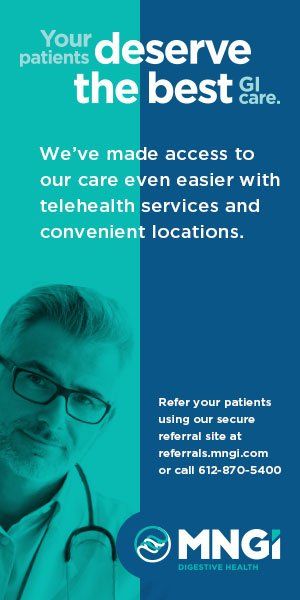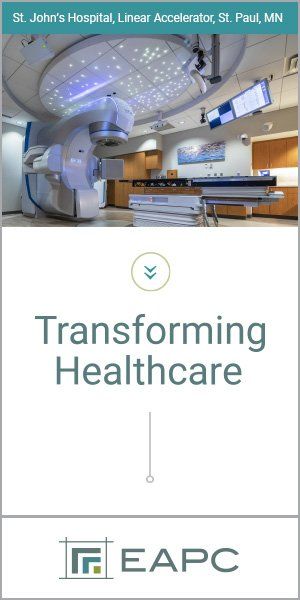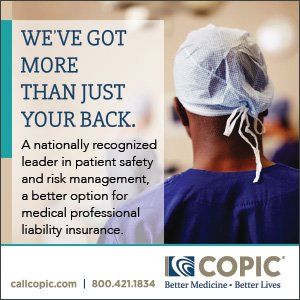August 2022
VOLUME XXXVI, NUMBER 05
August 2022, VOLUME XXXVI, NUMBER 05
Interview
Improving the Experience of Health Care
Hilary Marden-Resnik, President and CEO
During your time as interim president and CEO, you led UCare through a period of considerable growth. What can you tell us about this?
I assumed the interim role when UCare was in a strong position as a leading Medicaid, Medicare and Individual and Family Health Plan provider. As a result of our successful 2020 RFP response to serve the Prepaid Medical Assistance Program and MinnesotaCare members in the seven-county metro, we saw enrollment growth in these programs in 2021. We have a 46% market share of Individual and Family Plans sold through MNsure because of our well-priced and well-designed plans. We continue to attract retirees to our high-value Medicare Advantage plans.
We also grew our workforce to keep pace with the increasing complexity of our business, to improve member and provider experience and to launch new capabilities in, for example, our equity and inclusion, community response and technology transformation work.
What were some of the UCare responses and lessons learned during this ongoing pandemic?
We learned how agile we can be to respond to a public health emergency. We pivoted quickly to keep employees safe by immediately transitioning them to work at home in March 2020, without disrupting our members and providers. As part of our mission to remove barriers to care, we developed a community response team to support our members’ ability to get needed care during the pandemic. They focused on contacting high-risk members first.
As members’ use of telehealth services increased, we enhanced our support for those services. Our members also had access to our mental health hotline. We provided older, isolated members with iPads to help them stay connected. And we distributed more than 95,000 KN95 masks to the community. Before vaccines were available, we temporarily removed member copays for COVID testing, treatment and hospitalization, and we discounted premiums. Once vaccines were available, we helped members get their vaccines, hosting 85 vaccine clinics and arranging transportation and interpretation services.
Please discuss the good and the bad of Medicare Advantage plans.
As a continuous Medicare Advantage plan provider since 1998, we believe firmly that such plans are among the best options for Medicare enrollees because they combine original Medicare with extras such as dental, prescriptions, OTC, vision, hearing, fitness and healthy food savings. These plans also offer care coordination for members who can benefit from it. And Medicare Advantage plans can be more affordable than supplement (Medigap) plans.
Medicare Advantage plan enrollment has been growing nationally and locally because savvy seniors have picked up on the advantages of these all-in-one plans. Their popularity creates a crowded marketplace for consumers. Over the last few years, several new national, for-profit plan competitors entered our market, and that competition drives us to differentiate the value of being a regional, nonprofit health plan with strong community connections. This year UCare earned a 5-Star Medicare rating for quality, the highest possible rating. As a long-term Medicare Advantage plan with a loyal membership of over 116,000 members, we continue to see growth opportunity in this business line.
UCare offers the services of what you call Medicare de-complicators. What are some of the most common things these people do?
This question cuts to the core of our mission to make health care more accessible for everyone. Our Medicare de-complicators are spread throughout UCare—from our sales and customer service representatives on the frontlines to our marketers, member experience, clinical and operational staff behind the scenes. The de-complicators simplify the complexities of health care and health coverage for our members and prospective members. Our sales team offers 1:1 consultation or community meetings to help shoppers find the plan that best fits their needs.
We have a Say it Simple initiative that requires all communications to be written at an 8th grade reading level or lower. We define and explain insurance terms such as coinsurance, deductibles, out of pocket maximum, etc., in simple and relatable ways. We use infographics to illustrate concepts. We limit the number of words in each sentence. Health care can be so overwhelming, and we want to take the stress out of it by de-complicating it for our members and prospective members.
We want physicians to know how deeply we value their partnership in serving our members with quality care.
What strategies do you have for diversity equity and inclusion issues?
These strategies are inspired by our goal of being an anti-racist organization. We focus on four dimensions of diversity, equity and inclusion—clinical, community, county and culture. We engage in clinical interventions to improve access, care and outcomes—especially in communities with the greatest health care disparities. We provide community support to address social drivers of health, such as food insecurity and education gaps. We also support countless county public health initiatives. Internally, we’re focused on building on our already very strong and mission-driven culture through enhanced focus on diversity, equity and inclusion.
Last year we hired our first VP of Equity and Inclusion to lead a new Department of Equity and Inclusion, and our board of directors has evolved its committee structure to ensure the board carries out its work with an even greater focus on equity. We’re also supporting the Minnesota Medical Association’s development of anti-racist cultures among Minnesota health care organizations, as well as the Minnesota Hospital Association (MHA) Workforce Development Roadmap initiative, addressing the workforce crisis and opportunities to diversify the workforce.
What can you tell us about your plans to offer services in Iowa?
We submitted an RFP response in May to serve members of Iowa’s Medicaid programs and expect to learn the results later this summer. Our plans to offer services in Iowa support our strategic growth goals. Iowa presents our first major expansion opportunity outside of Minnesota and Western Wisconsin. We are excited at the prospect of bringing our community-based, nonprofit approach to Iowa. Our strong midwestern values and long history of service and innovation for Medicaid members would make us a strong partner with Iowa if we are awarded a contract. Some examples of innovations are our Mobile Dental Clinic, drive-through vaccine and flu shot clinics and our Community Response Team.
Care coordination is becoming an increasingly important issue. What kinds of services are you offering in this area?
Care coordination is a vital service we provide our members—particularly benefiting members with multiple and complex health needs. Care coordinators are our members’ allies and advocates. They stay in close contact with members to help them get connected to care. Care coordination helps ensure: member access to health care and community and waiver services, improved member outcomes and the living arrangement of choice for our members.
Care coordination at UCare is a collaborative process; it helps connect all the health care dots for our members through assessment, planning, facilitation and advocacy for options and services to meet our members’ needs. We help members receive access to care, social or community supports, a safe living environment and self-reliance. An important aspect of how we coordinate care is including awareness and sensitivity to culturally appropriate issues.
Health care workforce shortage issues present a growing crisis. What are some potential solutions to these complex problems?
We are so grateful for the health care heroes who have provided care throughout the ongoing pandemic. Burnout and resignations continue to be a real concern, though. A potential solution includes providing more tuition support and leniency for students in medical school and allied professions, as well as forgiveness of student debt upon graduation.
At UCare, we are invested in helping providers diversify their workforce so our members have access to trusted health care professionals from within their own communities. To address the shortage of mental health workers, we recently engaged in a cross-sector partnership with Alluma and the Amherst H. Wilder Foundation. This partnership will pay for clinical internships supporting prospective mental health professionals from underrepresented, underserved communications in both rural and urban Minnesota. We have joined the MHA on its Workforce Development Roadmap initiative addressing the workforce crisis, as well.
What short and long-term goals do you have for UCare?
Short-term, our goals are to continue to be a market leader in Minnesota. Additionally, we hope to bring our Medicaid model—that puts equity, community and the UCare values first—to the citizens of Iowa. Another goal is finalizing our technology transformation to be more efficient and effective in serving our members, partners and regulators. We look forward to county expansion opportunities, pending results of the most recent Minnesota Senior Health Options, Minnesota Senior Care Plus and Special Needs Plans RFPs. And we’re excited about our work with Lifespark to transform the experience of aging for Medicare members.
Longer term, our goals are to continue to support members and providers through potential market changes, such as the resumption of Medicaid eligibility after the Public Health Emergency ends. We are committed to our goal of being an anti-racist organization, implementing the next phase of equity and inclusion work to benefit employees, members and their communities. Another critical goal is to leverage opportunities to improve member and provider experience wherever we can.
What would you like physicians to know about UCare?
UCare was founded by a physician group at the University of Minnesota Medical School Department of Family Medicine and Community Health 38 years ago, so we’ve always felt a strong bond with physicians and our provider partners. Although we have been an independent health plan for many years, we are proud of our history and we want physicians to know how deeply we value their partnership in serving our members with quality care. We want to make it easy to work with us to provide a path for our members’ best health. And we are always interested in supporting their outreach and innovations to improve health and racial equity, social drivers of health, child and maternal care, mental health, substance use disorder services and chronic conditions. We consider our extensive, high-quality provider network to be a huge asset, and we are grateful every day for physicians’ tireless efforts to improve the health of our members and their patients.
Hilary Marden-Resnik, is president and CEO of UCare. She joined UCare in 2010 as senior vice-president and chief administrative officer. She holds degrees in economics, law and industrial relations/human resources management.
MORE STORIES IN THIS ISSUE
cover story one
The Moral Law Within: Care beyond medical services
By JULIA JOSEPH-DI CAPRIO, MD, MPH
cover story two
Care Coordination: Improving patient satisfaction and engagement
Bonnie LaPlante, MHA, RN
capsules
Top news, physician appointments and recognitions
Interview
Improving the Experience of Health Care
Hilary Marden-Resnik, President and CEO
Medicine and the Law
The Interstate Medical Licensure Compact Commission: Expanding your practice opportunities
BY Marschall S. Smith
Administration
The Minnesota Rare Disease Advisory Council: A new resource for patients and clinicians
BY Erica Barnes, Ma, CCC-SLP
Health Care Policy
Physician Advocacy: You are needed now
BY PETER DEHNEL, MD
AUGUST 2024
cover story
Assessing and Advancing Community Health: The overarching value of equity
BY Brooke Cunningham, MD, PhD
CONTACT
(612) 728-8600 | comments@mppub.com
758 Riverview Ave | St. Paul MN 55107
© Minnesota Physician Publishing · All Rights Reserved. 2023
quick links
We welcome the submission of manuscripts and letters for possible publication. All views and opinions expressed by authors of published articles are solely those of the authors and do not necessarily express those of Minnesota Physician Publishing Inc., or this publication. The contents herein are believed to be accurate but are not intended to replace medical, legal, tax, business or other professional advice or counsel. No part of this publication may be reprinted or reproduced without written permission from our publisher.















